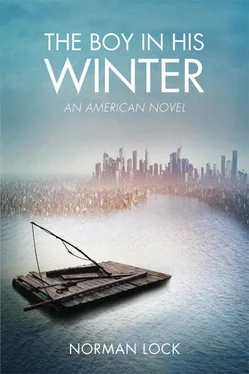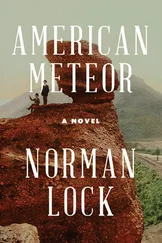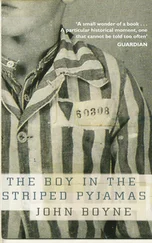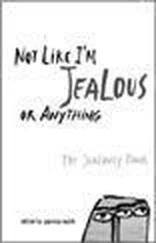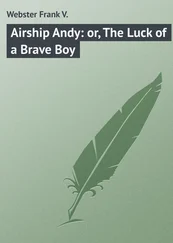My logbooks are entrusted to the safekeeping of my friend and executor, Marco Knauff, a Dutchman I met in Papendrecht; they might serve as an appendix for my memoir. Remind me to give you his address.
Yes, I was content to be in Santa Monica with Jameson for as long as we were together. Which was long enough for happiness, but not so long as to see happiness become like the porridge set before me with a thump on the table by Miss Watson as a punishment, the spoon tasting like tarnish, stiff in the cold gray mound. What made me happy was the perfect ordinariness of our years together. Days passed, one merging without comment into the next. She made her picture books. The Boy in His Winter won a Caldecott Medal. I wrote articles for a yachting magazine. My style was praised. I rode in boats, but my voyages by river or by sea were finished. We took our meals together. We watched television or read. We made love when desire summoned us. We rested, slept, and submitted to our separate dreaming on the black rivers of sleep, which never will converge. Returning, we kept those figments to ourselves, like two guilty persons surprised by what is either too precious or too disturbing to share.
Were we ever bored?
Many times. Boredom is an aspect of time, impossible to escape. (I was never bored during that aeon on the raft with Jim, because we traveled outside time, or beyond it.)
Did Jameson love me?
Who can say what another person thinks; how he or she loves or hates? Dragons nesting on their golden hoard, we guard our deepest feelings — tender or base — like a wound that secretly thrills. That is, if we are aware of them; I think the most important lie too deep for sounding. But yes, I suppose Jameson did love me. She behaved toward me like a woman who loves someone over the course of years, constantly and inconstantly. I read her feelings, even those hidden from herself, the way a pilot does a river’s bars and shoals. She was sometimes warm and at other times cool as our affection waxed and waned and waxed again. So yes, all in all, Jameson loved me, and we endured.
I remember little of our nearly twenty years — shy of twenty by a little less than two. Our marriage was like a journey down an unknown river so uncommonly wide you can’t see the shore. Afterward, you recall water, moving fast or slow, not much else. Let’s see. I remember black umbrellas tipping rain when the mourners leaned to look at Jameson’s father lowered into the raw, blackish earth. That was the beginning. And that was at the end, also — only it was Jameson’s turn to disappear and mine to watch alone. My umbrella was furled; the rain had only threatened; the earth was not so black, but raw notwithstanding. But those dismal parentheses enclosed a life, which passed, for beings like us, with the speed and terrible suddenness of time.
I’ll tell you something else I remember: a picture. For years and years while I was with Jameson, I had not thought of Jim or Tom Sawyer. Or if I did, they seemed figures in a childish dream. And then on an afternoon when I was going through her things— handling them as if they carried, like a light-sensitive emulsion, the memory of her face — I came across a book of Civil War photographs made by Brady, Gardner, Gibson, O’Sullivan, and the rest. And among those taken at Vicksburg, was one of Jim in front of a white tent, fixed forever in time and space. And the black and formless shape (a smudge of shadow) caught in the tent flaps’ narrow darkness must be Huck. Must be I . I tell you it has to be! I recalled how the photographer had shooed me inside, to shuffle nervously among dead men stacked in waiting for the cart. The photographer had wanted only Jim for his wet-plate negative. He may have chosen him for no other reason than the picturesque effect of a black man posed against a white tent. But by an accident of color and falling light, Jim’s existence had been confirmed, while Huck’s — mine — had not. The picture unnerved by recalling me to the long-vanished past while, at the same time, it caused me to doubt it. In panic, I came near to forsaking Albert Barthelemy for Huckleberry Finn!
I stayed in the apartment where Jameson and I had lived, with its view of the Pacific Ocean, which in Huck’s time had been America’s manifest destiny. (Because the nation’s impressionable years coincided with my own, its destiny may well be mine. If this is true, I’ve spent 240-odd years trying to evade it.) You may think me like the starling, which appropriates the home laboriously carved from a dead tree by the industrious woodpecker. But I was jealous of the place where she’d lived. She lingered yet in the curtains, the wardrobe, the drawers, in the spoon she used to stir her tea. Even now, so very many years later, I can hear its pleasant clatter against the bone of china cup and saucer blooming with mauve roses.
So I stayed on, writing boat reviews and collecting, as her assignee, royalties from her picture books, which did well, especially “ours”; I mean The Boy in His Winter, whom I was fast becoming. Like a loose tooth we wiggle in the gum — half in fear of pain, half for the pleasure it incites — I would read it during days of nostalgia or self-pity. It’s gone, that book; I don’t know where I lost it. I wonder if it’s in print anymore. I still have Jameson’s book about the giraffe. Remember, I recited the first page. The last went like this: “I see a giraffe, standing at the edge of the world. On one side is the night. But he is not looking at the darkness. He faces the light that is spilling over the earth’s shining edge. See how he is standing in it?” Mother and Father looked. And they saw Rupert. They saw him wading in a flood of golden sunshine as the sun began to rise. I like to think it was Albert who was looking at Rupert, whose name might as well have been Jim. Do you know I’d forgotten what Jim looked like? If it weren’t for the photo of him at Vicksburg, he would have vanished forever. My past had haunted me and then, what’s worse, it deserted me.
I tried once to write a book of my own: a time-travel novel, of all things. But I couldn’t imagine a machine to shuttle between the tenses as gorgeously as Wells’s had. So I gave it up and, turning seventy, stopped writing for the magazine and yielded entirely to stillness. I could no longer afford the apartment with its view of the ocean, and found a cheaper one in town, on Euclid Street near Fourteenth. I smiled to think what Jim and Tom would say if they knew I’d arrived, at last, in Mexico, even if it was only “Little.” I frittered away time, happy to squander that element which had figured even more than water in my life and its story.
I dawdled in the streets of Little Mexico, drinking cervezas or Mexican sodas on the corners with people whose faces looked as if they’d been shaped from red clay and earth. I loved them, though I suspect they merely humored me. They called me Señor Alberto, and the young women flirted because they found me comical. I did so myself. There were no rivers left for me, and I came no nearer to the ocean than the end of Santa Monica Pier, which I visited at night to be still amid a moving crowd, listening to tender words or unkind ones, or to the popular music of the time as I had, in an earlier age, to the songs of Stephen Foster or the shameful tunes of minstrelsy. I stood on the end of the pier, like Rupert at the edge of the world, and watched fishermen dream of once more lifting into the gaudy light Pacific mackerel, bonito, halibut, and thornbacks — banished sadly and forever from the animal kingdom. I never held a rod again, or a woman either, except, in farce, a brazen señorita in the Euclid Street Laundromat.
I became a tourist on the Internet. I would sit at my computer, poring over satellite maps of — what else? Rivers! In my room in Little Mexico, I went over every stretch of fresh or brackish water I had known, beginning with the Mississippi and ending on the Rhine. Next, I sought out rivers I did not, and would not, ever know: the Nile, Orinoco, Volga, Zambezi, ancient Tigris, golden Mekong, labyrinthine Amazon. There are many rivers, and I spent months and years on them, seeing them as roving satellites must and — at the limit of magnification — as I would have, standing on their heights. My delight was to edge up, by degrees, until — suddenly — the river revealed its vessels to me: stolid tugs on the Hudson, coal barges on the Danube, oil tankers on the Jordan, dhows leaving the Indus for the Indian Ocean, junks tacking on the Perfume River, fragrant with fallen blossoms, past the tombs of the Nguyễn emperors.
Читать дальше
